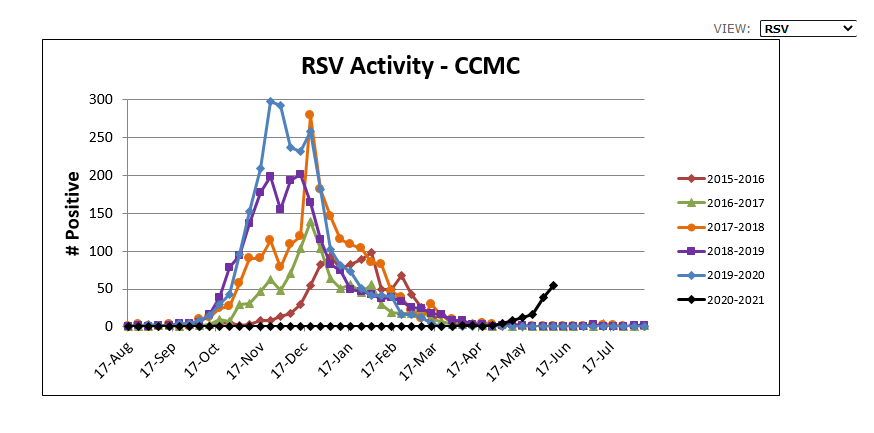RSV Rates on the Rise During an Unlikely Time of Year
Over the last week, Cook Children’s Medical Center has seen 55 cases of respiratory syncytial virus (RSV). RSV is typically seen in the fall and winter months, and experts are stumped about the reasoning for a summer outbreak. Mary Suzanne Whitworth, M.D., medical director of Infectious Diseases at Cook Children’s, says she doesn’t know just yet why this outbreak is happening in June, but she does know it is tied to the global COVID-19 pandemic. Additionally, the medical center didn’t have any cases of RSV this past winter, and experts tie that to the global pandemic as well.
“You don’t typically have two viral epidemics at the same time,” Dr. Whitworth said. “We’ve never had an RSV outbreak in June.”
Dr. Whitworth says the medical center began to see RSV patients in early May. Over the last few weeks, there has been an increase in RSV patients and the number is rising each week.
“The numbers reflect inpatient and outpatient testing done at the medical center,” Dr. Whitworth explained. “It looks like we could have an RSV season ahead of us at an unexpected time of year.”
According to Dr. Whitworth, RSV is a very common respiratory virus that we all get every one or two years throughout our lifetimes. The first time you get it, you might be sicker and some children require hospitalization, but most do not. In infants younger than six months, RSV infection may result in symptoms of irritability, poor feeding, lethargy, and/or episodes where they stop breathing with or without fever. In older infants and young children, a runny nose and decreased appetite may appear one to three days before cough, often followed by sneezing, fever, and sometimes wheezing. Symptoms in adults are typically consistent with upper respiratory tract infections, including runny nose, sore throat, cough, headache, fatigue, and fever. RSV can be a very serious illness for anyone who is immunocompromised. But for most children, it is a minor upper respiratory infection.
“The virus is spread by respiratory droplets and can be spread from person to person very easily,” Dr. Whitworth said.
If parents begin to see any RSV symptoms in their child, Dr. Whitworth says it is important to keep them well hydrated.
“They can use Tylenol if they have a fever,” she said. “Cough and cold medicines are not routinely recommended for children two years old or younger because of the side effects.”
She says if parents are worried that their child is having difficulty breathing, or if they are concerned that their child is lethargic, not eating or drinking enough, or irritable, they should call their primary care physician.
Dr. Whitworth says the most important thing to stress is, “RSV is common, and most children don’t require any treatment at all.”
This trend at Cook Children’s is a part of a larger RSV outbreak across the South. Late last week, the Centers for Disease Control and Prevention (CDC) issued a Health Advisory Network warning to health care providers to be on alert for the virus.
Important to note:
Cook Children Urgent Care facilities do NOT test for RSV. Please discuss any questions with your child’s medical team.
